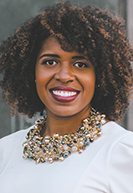Subscriber Benefit
As a subscriber you can listen to articles at work, in the car, or while you work out. Subscribe Now
By Katie Jackson-Lindsay, Jackson Legal Services P.C.
In 2020 our seemingly normal world and daily routines were wrecked in what seemed like an overnight flip of the switch. The world stopped. Confined to our homes and safe social bubbles, we were forced to face all the things we promised ourselves we would “get around to,” like learning to bake bread and organizing storage closets full of Christmas decor and family photos. Then, as if facing our chores was not enough, a police officer in Minneapolis suffocated a Black man with his knee on his neck for over nine minutes. For many of us, the world stopped again. Now we had to face yet another mountain that we thought we had time to get around to …the inequitable treatment of people of color in our country. The social justice movement of 2020 forced us as a nation into a tailspin of self-evaluation. No matter our race, we found ourselves asking how we have contributed to this problem, or what we could do to eradicate it? With genuine intentions, everyone tried to start “doing better” and being mindful of the struggles that we as minorities have faced our entire lives in this country. Open and honest conversations started happening and in many ways, across various sections of our society, things have changed.
The first time the world stopped and the switch was flipped in 2020, we knew that we just needed to be patient and let the scientists do their work. With enough time, research, trials and development, a vaccine would be on its way to save us and COVID would surely lose its terrifying reign over our world. We just needed to keep ourselves safe in the meantime. And just as we expected, it happened. As we now walk around maskless and unafraid to hug a dearly missed colleague, it is hard to remember what those early days of terror felt like when we watched news of the deadly virus across our television screens.
However, unlike the first time the world stopped in 2020, the second flip of the switch has proven to be more difficult to cure … it is much different. For people of color, the switch did not flip on the day that we learned George Floyd’s name. We had lived in that darkness for a very long time before the rest of the world was forced to join us due to his killing being broadcast across international news. Despite the best of intentions, it is hard for those of us suffering from this injustice to believe that a cure is on its way. The feeling from those early days of terror is our daily existence. For us, there is not enough research, trials or development in the world to undo that pandemic in short order, and like the world’s response to COVID, we have found ways to cope and protect ourselves in the meantime. This has often resulted in a disconnect between well-meaning allies who genuinely want to effectuate change and those of us on the receiving end. Time and again since 2020, especially as a bar leader for a minority bar association, I have heard some version of the sentiment, “Despite our efforts to increase diversity and be inclusive, we did not get a diverse pool of applicants/attendees/participants.” Pardon our hesitation; building trust takes time.
Similar to our early responses to the COVID vaccines, trust for these proposed solutions to the social injustice pandemic will not be achieved overnight. Truly being intentional about diversity, equity and inclusion is going to require us to continue to confront the challenges that come along with implementation. Being intentional means having honest conversations, (even when they are difficult or personal), accepting feedback (no matter how hard it is to hear), evaluating and making adjustments based on that feedback and, from all of this, creating not only partnerships, but genuine relationships among entities and individuals.
The need for diversity, equity and inclusion initiatives was born out of over 200 years of systemic racism and mistrust. Pardon our hesitation if two years is not enough. Even when sharing the topic of this article with my family, I received the response, “What is the point … nothing will change.” It will take time to get on the right path. What is important for now is that we all do our part and stay the course … I am optimistic that we can manage that.•
Jackson-Lindsay is the 2022 President of the Marion County Bar Association and a member of the Indianapolis Bar Association.
Please enable JavaScript to view this content.
